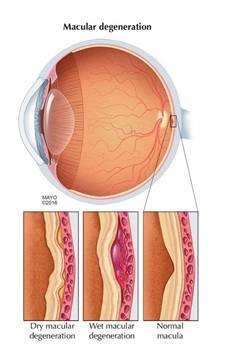
Age-related macular degeneration is a common cause of age-related vision loss. It's the No. 1 cause of vision loss for adults over age 50. It affects the retina, particularly the macula, a portion of the retina with specialized cells that allow you your sharpest vision. Your retina consists of layers of neural tissue that line the back part of the eye that sends information from the eyes to the brain.

Just like a baseball diamond infield is where most of the action happens, most of the important vision tasks are done by the cells in the macula. This includes things like reading, recognizing faces and viewing road signs.
Degeneration means a deterioration of vision. Exudative age-related macular degeneration, also called wet macular degeneration, can cause permanent and rapid central vision loss. Nonexudative age-related macular degeneration, also called dry macular degeneration, may take a long time and proceed slowly but can also cause severe central vision loss over time.
Dry macular degeneration
This form of macular degeneration develops first and a physician who specializes in eye care — an optometrist or an ophthalmologist — can detect it during a dilated eye examination.
It's the most common form of age-related macular degeneration and can be associated with gradual blurriness of the central vision or occasional waviness of straight lines, such as light poles or the edge of a doorway. If the retina is a baseball infield, dry macular degeneration is like getting pebbles, dry patches, large pot holes or the entire loss of the infield grass.
Dry macular degeneration may be asymmetric, and one eye can be more affected than another. Over time, vision worsens and affects the ability to perform everyday tasks. Having dry macular degeneration doesn't mean you will lose all your sight. Vision loss involves your central field, and you will never go completely blind. You lose your ability to read and recognize faces.
Wet macular degeneration
Wet age-related macular degeneration, the exudative form of the disease, can cause sudden blurriness to complete loss of central vision. Wet or exudative refers to the growth of abnormal blood vessels called neovascularization. This can leak serum and blood under and into the retina. This would be like the infield grass getting soggy from leaky pipes underground. It leads to slippery localized conditions, presenting as distortion and small spots, to a complete washout, presenting as a total central loss.
Preventing macular degeneration
The exact cause of macular degeneration is unknown, but the condition can develop with age and can run in families, although not always.
If you're over 50 and have a parent or sibling with macular degeneration, follow these tips:
- Get routine dilated eye exams.
Inform your optometrist or an ophthalmologist if you have a family member with macular degeneration and would like to be checked for any signs. Have your eyes examined as recommended by your health care team. - Aim for good overall health.
Maintaining a healthy weight, and normal blood pressure and cholesterol levels are good for the eyes as well as the body. Follow your health care team's instructions for managing other medical conditions to keep your eyes healthy. - Stop smoking.
Don't start smoking and if you do smoke, quit. People who smoke have a greater chance of getting macular degeneration at an earlier age and often, their disease is more severe than people who don't smoke. - Eat lots of vegetables.
Eating leafy greens, such as kale, spinach and collard greens, provides key vitamins that improve the health of your retinas. - Be proactive.
Ask your health care team what level of age-related macular degeneration you have, such as early, intermediate or advanced. If you have intermediate or advanced, you can decrease your risk of severe vision loss by taking a mixture of antioxidants that were studied as part of age-related eye disease studies (AREDS2).
Macular degeneration treatments
You can't reverse damage caused by macular degeneration, but treatments can slow the progression and preserve existing vision when started early.
If you have dry macular degeneration and have maintained your peripheral vision, low-vision rehabilitation can help you adapt to your changing vision. Taking high doses of antioxidant vitamins and minerals may help reduce vision loss. Some people can benefit from a telescopic lens implant that magnifies their vision. This is surgically placed and can improve a narrow field of view.
For wet macular degeneration, the goal of treatment is to shrink or decrease leakage from abnormal blood vessels. Commonly, this can be done with medications injected into the eye. Sometimes, treatment includes thermal or nonthermal lasers. These treatments usually need to be repeated as leakage from the abnormal blood vessels can recur over time.
An optometrist or an ophthalmologist can perform comprehensive eye examinations to screen for macular degeneration. Visit an optometrist or an ophthalmologist for routine exams as well as sudden central vision loss.
Michael Scott, M.D., is an ophthalmologist in La Crosse, Wisconsin.
Related Articles







